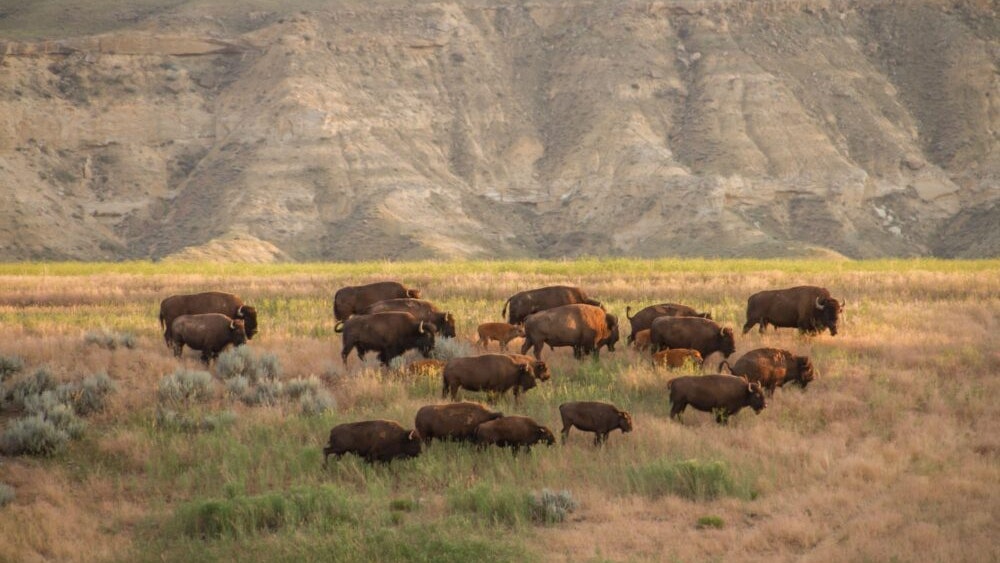LARAMIE — Opinions were split over whether to allow concealed firearms on the University of Wyoming campus during a town hall meeting on campus Monday, although most there seemed to be against it.
“If the majority of students say they don’t want this, then who is this for?” said Ven Meester, editor-in-chief of the UW Branding Iron campus newspaper.
That, and similar comments of his drew robust applause from an audience gathered to listen to panelists discuss a draft proposal to loosen UW’s firearms policy.
UW alumnus Sandy Rees received a less enthusiastic response when she spoke out in favor of allowing concealed carry firearms on campus.
“You need to follow the statutes and the laws, not squishy feelings and surveys,” she said.
Meester was one of the panelists, along with UW Chief of Police Josh Holland, UW President Ed Seidel, UW Vice President and General Council Tara Evans, and George Mocsary, director of the Firearms Research Center and professor at the UW College of Law.
What UW Trustees Must Decide
If it’s approved by UW Board of Trustees, the proposal would allow concealed carry permit holders to carry firearms in most UW facilities. It’s set to be considered by trustees during their next meeting, scheduled for Wednesday-Friday.
Only people 21 or older would be allowed to carry concealed handguns, and open carry would not be allowed. Long guns, such as rifles and shotguns, would also not be allowed.
Guns would remain banned in certain spaces on campus and at certain events. Some of those would include laboratories containing hazardous materials and sporting events where alcohol was being served.
The draft proposal of a new firearms police was prompted by a directive from Wyoming Gov. Mark Gordon, Seidel said.
Last year, both houses of the Wyoming Legislature passed a measure that would have done away with the state’s gun-free zones entirely. Gordon vetoed it.
One of the conditions of his veto was that state agencies, such as UW, draw up proposals for how they might change their firearms policies, Seidel said.
UW policy now all but bans guns on campus. People may apply with the UW Police Department for an exception if they can prove a pressing need to be armed. For example, if a person is being threatened by a stalker.
Do Guns Make Campus Safer, Or More Dangerous?
Much of the discussion at the town hall centered around whether allowing firearms on campus would make it safter or more dangerous.
Mocsary said that concealed-carry guns have long been allowed on campuses in other states, such as Utah. There hasn’t been a significant uptick in violence on those campuses, he said.
When it was pointed out that Wyoming consistently has one of the nation’s highest yearly suicide rates, Mocsary said the campuses that allow guns haven’t seen increased suicide rates either.
He got some pushback from the audience on that point, with some citing a 2017 study that shows when firearms are allowed on campus, the number of suicides by firearms increases.
It was pointed out that according to polls taken of UW students, faculty and staff, most opposed allowing concealed carry at UW.
And since much of the student body is under age 21, some questioned whether the proposal would do much for most UW students.
Regarding firearms in dorms, Mocsary said there probably wouldn’t be many there, because most dorm residents are younger than 21.
Many resident assistants (RA) — or students in charge of their dorm floors — are older than 21, some pointed out. It was also mentioned that many people living in UW’s student apartment complexes are over 21.
If an RA in the dorms decided to keep a firearm, it would have to be locked in a secure, hard-sided safe anytime it wasn’t on their person.
Meester argued that if, “God forbid,” an RA went on a shooting spree, the other dorm residents not old enough to carry, would be defenseless.
Mocsary said that concealed carry permit holders are exceptionally “law-abiding,” and that to his knowledge, none of them have ever started a shooting spree. But since mass killers typically pick places such as crowded classrooms, having concealed carry permit holders there, who could immediately fight back, could save lives.
Others argued that the risks of suicide, accidental shootings and other hazards outweigh the potential benefits.
Rees said she resented not being able to carry a firearm to defend herself when she was an instructor at Metro Community College in Omaha, Nebraska. She also resents that her daughter, currently a UW student, is likewise unable to defend herself.
Doing It The UW Way
In a letter explaining his veto of the legislation to eliminate gun-free zones, Gordon said the measure would have taken away the agency of businesses and institutions to decide gun policy for themselves. But proponents of the measure said Gordon was wrong, because the Second Amendment should supersede any local regulations.
Seidel said that by drafting the concealed carry proposal and putting it before the trustees, the matter would be decided “as much as possible on our (UW’s) terms.”
UW alumnus Tom Dziedzic told Cowboy State Daily that he also favors the matter being decided by UW and people directly affected, rather than being mandated by the Legislature.
His child attends the UW Early Care and Education Center, which is east of the main campus, and he’s against allowing concealed carry there, or at other UW facilities.
“It seems like nobody here really wants this (concealed carry proposal),” he said. “Are we creating this just of the sake of creating it?”
Contact Mark Heinz at mark@cowboystatedaily.com
Mark Heinz can be reached at mark@cowboystatedaily.com.








